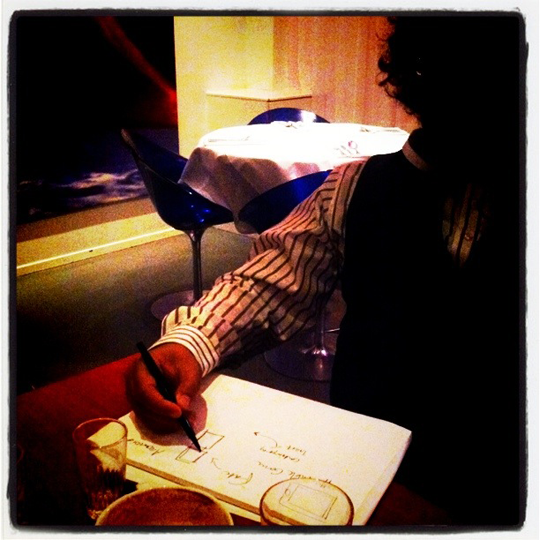Project Maguro is finished and on this Monday, we’re doing a quick evaluation. Entering the war room provides us with an interesting sensation. It’s as if we can still smell the gun powder. Hear explosions faintly, in the distance — but only when listening intently. Sitting down, it feels like we’re expected to start crunching again. But all that is history now. At the end of everything, what remains is formalities, food and fun.

It takes a while for the realization to truly sink in. The project that kept Kars, Karel, Alper, Simon and me busy during the early part of 2011 is done. It’s been delivered to the client, as well as to the client’s client. And all layers of client seem to be happy. Which, in turn, makes us happy.
By the time you read this, our project has been revealed as being called Code 4. And the ‘large governmental organisation’ we made it for, turns out to be the Dutch Tax Administration. Currently the game’s had multiple runs and should be causing organizational change like there’s no tomorrow, right now.
Asked by Kars how I feel about the project, the thoughts that pop up are not really about Maguro — they’re about me, and about these other guys. As a writer, freelancer, web guy, I’m used to working alone. Twitter, Facebook and e‑mail are my only contact with the outside world. Projects seamlessly flow into one another. I don’t think about my processes, they just happen instinctively. All that changes when you work in a team. Which took a while to adjust to — but I think I nailed it in the end.
And what a team it was. I guess it felt like being in a rock band because that’s what I associate with a bunch of smart, too-cool-for-school kids, each complete with their own incredible super powers. (That’s a link to the first part in this series, which is wrapped up by this post. Be sure to also read the middle episode. You know what they say about middle episodes in trilogies.)
I then say something about the game’s iterative development process, which revolved so fast that each prototype felt more like a trampoline than the intended quiet moment of reflection. It’s a miracle that in the end, the plan got together — which I love. Or maybe it’s just a lot of intelligence, experience, hard work and perseverance stacked together. In a box. With a ribbon.
We head out to Luce, where they serve great cocktails and grappa, it turns out. The food is nice, too. An iPhone game called Coin Drop is discussed, which I dismiss as being a poor man’s Peggle, but end up spending the next few days getting all of the game’s stars anyway. Next, we determine that the idea that doing something in real life is always better than doing it virtually, is a decidedly calvinistic way of seeing things. After which we all agree that games are really about learning to learn.
Late at night, Karel starts drawing up two of the game concepts swirling around that enigmatic mind of his. Naturally, the end of project Maguro is the beginning of something new.



One Comment
I am a university teacher, and I have always been dissatisfied with the ‘passive’ classroom teaching. Especially so for my entrepreneurship classes. I am so happy to have come to your website and to know that out of class activities are very much feasible and people are doing it. I will continue to visit your websites to gain inspiration, and to design games for my class. I can see that it is a very creative process and I may need to get out of my comfort zone (doing powerpoint presentations etc!). But thanks for being such a huge source of excitement for me!.
Best wishes from Kuching, Malaysia.
Amer